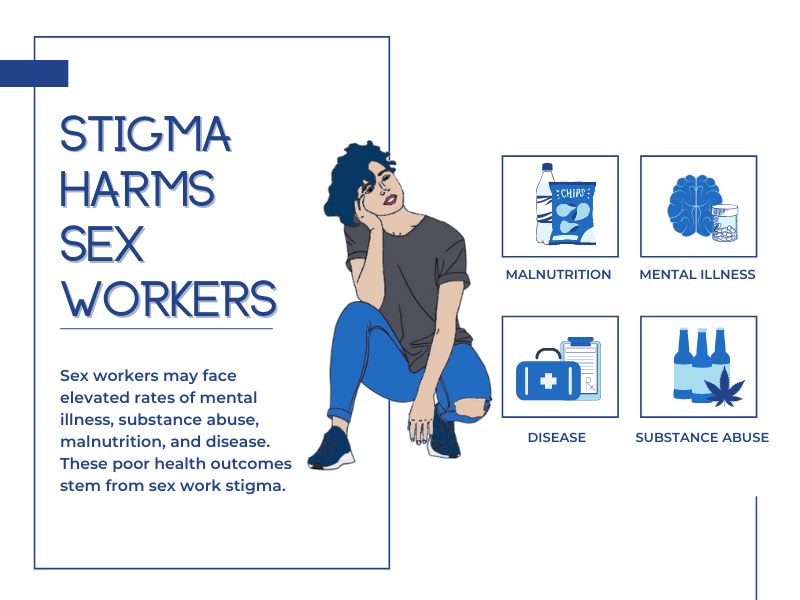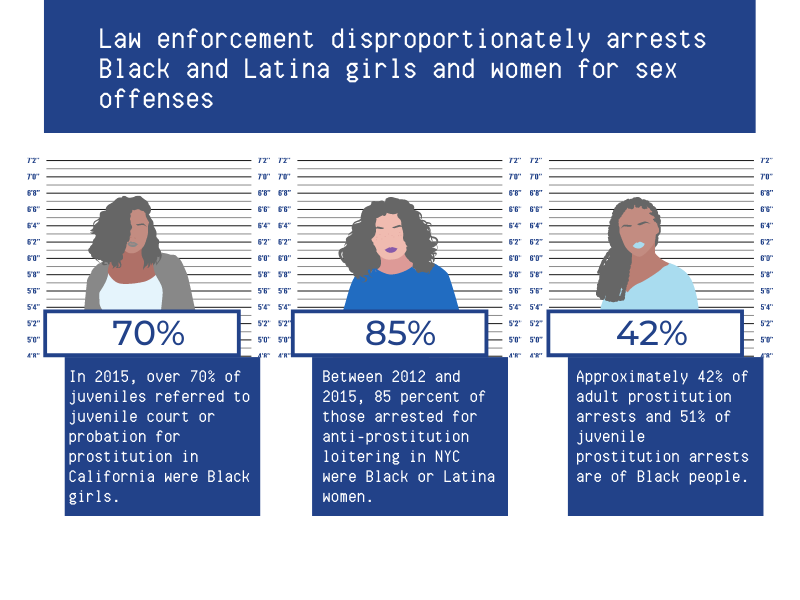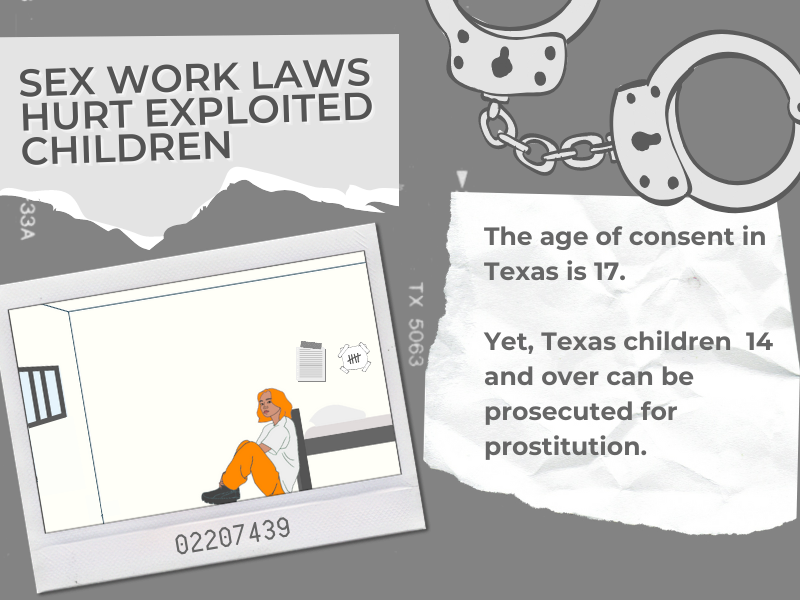Discrimination Against Sex Workers and How it Affects Their Daily Lives
Learn about the discrimination, marginalization and the need for decriminalization
Sex work, ranging from dominatrix to escorting, remains mostly underground despite demand. Sex workers remain vulnerable to exploitation even in states like California, where some sex workers now have employee benefits.
Making villains of sex workers from the American workforce disproportionately harms racial and sexual minorities.
In this article, we will explain what sex work is and is not, how laws disproportionately affect minorities, and the potential consequences of sex work to a parent who is going through a child custody case in Family Court.

Sex work and sex trafficking are different
Sex work is a consensual transaction of sexual services for compensation between adults. Many sex workers have financial independence and flexible hours.
Suppressive conditions and policies such as barriers to harm-reduction resources, education, and employment, make them vulnerable to sex trafficking and violence from clients, law enforcement, and managers.
Sex trafficking refers to someone selling sex under threat, abduction, or similar means of force and often involves runaway or abused children. The average age someone becomes sex trafficked is 12 to 14 years old. Sex trafficking is and should be illegal and the punishment should be severe.
People engage in sex work for many reasons
Economic and social disadvantages limit entry into all work sectors for marginalized communities.
Most people enter the sex trade for reasons that do not amount to force, fraud, or coercion, such as financial need. At least one in five Skid Row women report engaging in "survival sex" for food, money, drugs, or goods.
In New York, Rapper Cardi B chose exotic dancing (stripping) at age 18 to escape domestic violence and poverty. She went from making $250 weekly as a cashier to $2,000 nightly stripping.
Stripping may have saved Cardi's life. Black and Latina women account for 56% of all domestic violence homicides in New York City.
Disproportionate criminalization
Sex work disproportionately criminalizes and therefore harms racial and sexual minorities
Law enforcement disproportionately arrests Black and Latina sex workers for sex offenses. Approximately 42% of adult prostitution arrests and 51% of juvenile prostitution arrests are of Black people.
In 2015, over 70% of juveniles referred to juvenile court or probation for prostitution in California were Black girls.
NYPD officers may arrest someone waving at a car or wearing tight jeans for suspected sex work. These arbitrary arrests force many Black and Latina women into a cycle of poverty and incarceration due to a mounting criminal record.
Between 2012 and 2015, 85 percent of those arrested for anti-prostitution loitering were Black or Latina women.
Similarly, trans women face barriers to employment, housing, and access to services. Nine out of ten transgender sex workers or individuals suspected of sex work report suffering harassment, attacks, or assaults by the police.

Does the stigma lead to poor health?
Sex workers also may face elevated rates of mental illness, substance abuse, malnutrition, and disease. These poor health outcomes stem from sex work stigma. Sex workers do not universally experience the consequences of stigma.
California sex workers are not equal before the law
California classifies strippers as employees and prostitutes as criminals. Strippers have unemployment benefits and prostitutes have criminal records that may prevent employment in other industries.
And sex workers have immunity when reporting dangerous crimes, and law enforcement cannot use condoms as evidence to arrest them. Research supports California's laws as an effective anti-sex trafficking intervention.
For example, an absence of criminal charges empowers a sex worker to detect and report sex trafficking to law enforcement and to carry condoms for safer sex.
Recent laws should reduce sex trafficking in California
California's human trafficking rate is the highest in the country, and 21% of its cases involve minors.
In 2019, there were 1,118 sex trafficking cases.
In "conservative" Orange County, approximately 83% of human trafficking victims are sex trafficked.
Numerous sex-trafficking laws hurt sex workers
Congress passed SESTA/FOSTA in 2018 to criminalize online services that knowingly assist, facilitate, or support sex trafficking on their platforms. Ultimately, sex trafficking ads rebounded to 75% of the original figure just four months after the legislation passed.
Now numerous online-based, adult sex workers must negotiate on the streets and risk arrests, pimps, and violence. Since its passage, 60 percent of adult sex workers reported having to work with riskier clients, a third reported elevated violence from clients, and some reported an 80% decrease in earnings.
Laws like FOSTA-SESTA treat sex trafficking victims and consenting adult sex workers as a monolith.
A better decriminalization model
Domestic violence, sex trafficking, and victimization remain illegal under a full decriminalization model. Decriminalization only removes criminal penalties for sex workers who are consenting adults and their consenting, adult customers.
Without total decriminalization, sex workers have restricted access to public health services, legal protections, and human rights.
A criminalization model allows Hawaii's police to have sex with prostitutes as "evidence" for arrest, and, according to SWOP USA, may have allowed police to rape 24% of Chicago street-based sex workers that reported a sexual assault.

Sex workers face discrimination inside the family law courtroom
Hypothetical number 1
Here is a hypothetical. Imagine a father and mother going through a child custody proceeding in California Family Court. Imagine the father is a recent, convicted felon and the felonies are all serious white-collar crimes.
There is however no evidence to suggest he is a danger to his children.
Will the mother successfully argue that because he is a convicted felon, the court should limit his parenting time? Probably not. "Just because he stole from people does not mean he is not fit to be a parent" the family law judge will likely think or perhaps even state.
Hypothetical number 2
Now imagine a hypothetical where the mother is a stripper. Again, there is no evidence to suggest she is a danger to her children. Yet, assume the father will argue this profession is illicit, attracts illicit people, and she is not fit to be an equal parent because of what she does for a living.
Do you think that will gain some traction in Family Court? Unfortunately, it probably will.
What if the mother was a sex worker, beyond stripping, but had no criminal record, no history of substance abuse and other than the consensual sex work, that child custody case was indistinguishable from any other normal child custody case?
Do you think if there was evidence of the sex work or she admitted to it, it may influence a California family law judge to question her fitness to have joint legal and physical custody? We believe it is likely that would influence the family law judge against the mother.
Finley Fawn's case may be the perfect example
What we wrote should not be surprising.
Finley Fawn lost custody of her son after her ex-husband convinced the Court she was an unfit parent as a cam girl. Sex worker stigma outweighed Fawns' credibility as a mother and the fact camming is legal and taxed.
The family court system has demonstrated a bias against disadvantaged groups, such as Native parents, low-income mothers, and domestic violence survivors. Sex workers often make up a variation of these identities.
Sex workers conceal sex work
Many sex workers conceal current or past sex work to avoid discrimination during child custody proceedings.
And sex workers are vulnerable to extortion from abusive partners who may weaponize a sex worker's job unless they submit to specific terms for alimony, child support, asset division, custody agreements, or exploitation.
Domestic violence is often a pull factor into sex trafficking.
A woman may fall victim to a sex trafficker while fleeing intimate partner violence or be forced into sex trafficking by an abusive partner. The perpetrator in each circumstance may use power and control tactics to injure or degrade the victim.
Sex crime convictions may have serious immigration consequences
Human trafficking victims in America are primarily immigrant women vulnerable to the deceptive tactics of traffickers. With around five million female immigrants living in California, prostitution laws threaten the livelihood and well-being of countless women and children.
A person could face charges under California Penal Code Section 647(b) for soliciting prostitution, agreeing to engage in prostitution, or engaging in prostitution. A charge may be considered an aggravated felony, a crime of moral turpitude for immigration, or both.
Aggravated felonies belong to a predetermined class of crimes under 8 USC § 1101(a)(43). An aggravated felony conviction may cause deportation and mandatory detention without bond. Depending on the case, a Section 647(b) conviction may be considered an aggravated felony.
A crime of moral turpitude refers to an offense that "shocks the public conscience." A noncitizen with a crime of moral turpitude conviction may face an immigration judge in removal proceedings. A Section 647(b) conviction could be considered a crime of moral turpitude, depending on the facts.
The criminal justice system vilifies sex workers
Sex work criminalization ineffectively deters people from participating in sex work but effectively cuts sex workers off from resources.
These conditions empower sexual predators to abuse sex workers with impunity. Sometimes, these sexual predators are law enforcement officers.
Sex workers seldom report crimes to law enforcement due to potential discrimination, arrest, and police abuse.
For instance, some Baltimore police officers admittedly do not take sex workers' victimization seriously because they believe violence is an unavoidable consequence of sex work.
One officer stated, "Could you imagine if a drug dealer reported to us that someone beat him up while selling or took all his drugs? It's unbelievable!"
And sex workers living with HIV may face felony charges for their status depending on their residence, even if they did not put a client at risk of HIV transmission.
Like anti-prostitution laws, HIV criminalization laws pressure sex workers and clients into high-risk situations and place unnecessary challenges on people trying to survive.
Sex work criminalization is a broken system
America pushed a risky industry into the black market without the proper legal and public health infrastructure before. The Eighteenth Amendment intended to protect families from alcohol-related consequences by prohibiting its sale, manufacture, and transportation.
Ultimately, unregulated alcohol production during the Prohibition caused 1,000 people to die annually, millions of arrests, overcapacity prisons, and billions in tax revenue loss.
The "war on drugs" has been a resounding failure and States are finally waking up to legalization. The Federal Government will hopefully soon awaken from this crime-producing nightmare they caused.
Prostitution prohibition continues in America, except for Nevada. Many oppose total decriminalization to protect women. Laws designed to truly protect the victimization of any gender are necessary but the women are telling you that is not what laws against consensual, adult sex work do.
There is a better way
Legal sex work models that reduce gender-based violence and disease discredit this savior complex.
For instance, Rhode Island effectively decriminalized indoor prostitution between 1980 and 2009. Rape and gonorrhea cases among sex workers decreased by 30 percent and 40 percent, respectively. That is not a coincidence.
America's stance on sex work and female autonomy is inconsistent. Pornography and stripping are legal, but sex for cash between consenting adults is where many Americans draw the line publicly.
This dubious morality comes at a price: sex workers' lives.